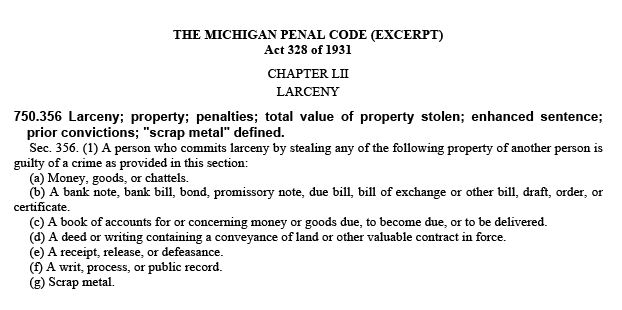Under Michigan Compiled Law, larceny is defined as the stealing of the property of one person by another. Larceny crimes in Michigan are serious offenses that carry stiff penalties, including jail time and fines. Larceny can be charged as either a misdemeanor or felony depending on the value of the property, where the crime took place and whether or not the accused has previous larceny convictions.
In this article we’ll discuss details on Michigan larceny charges. This includes misdemeanors, felonies, punishments, and what you should do if you’re being charged with this offense.
It’s important to note this article has been prepared for informational purposes and is not a substitute for professional legal advice. If you’re being charged with a theft crime such as larceny, you should consult with an attorney to ensure your legal rights are upheld.
Misdemeanor Larceny
 There are two situations where misdemeanor larceny can be charged, which will depend on the value of the property stolen. Be aware that the circumstances surrounding the case and any previous larceny convictions can cause what would otherwise be a misdemeanor to be charged as a felony. Below are the two ways in which misdemeanor larceny is charged in Michigan:
There are two situations where misdemeanor larceny can be charged, which will depend on the value of the property stolen. Be aware that the circumstances surrounding the case and any previous larceny convictions can cause what would otherwise be a misdemeanor to be charged as a felony. Below are the two ways in which misdemeanor larceny is charged in Michigan:
- If the stolen property is valued at less than $200, it is considered a misdemeanor which carries a jail sentence of up to 93 days and/or a fine of up to $500 or three times the value of the stolen property, whichever is greater.
- If the stolen property is valued at more than $200 but less than $1,000, it is considered a misdemeanor which carries a jail sentence of up to 1 year and/or a fine of up to $2,000 or three times the value of the stolen property, whichever is greater.
Felony Larceny
Like misdemeanor larceny, there are two situations in which felony larceny can be charged. This depends not only on the value of the stolen property and circumstances surrounding the crime, but also whether or not the accused has been previously convicted of larceny. Below are the two ways in which felony larceny is charged in Michigan:
- If the stolen property has a value of $1,000 or more but less than $20,000, it is considered a felony which carries a prison sentence of up to 5 years and/or a fine of up to $10,000 or three times the value of the stolen property, whichever is greater. This also includes the theft of automobiles, trailers and certain motor vehicle parts, regardless of value.
- If the stolen property has a value of over $20,000 it is considered a felony which carries a prison sentence of up to 10 years and/or a fine of up to $15,000 or three times the value of the stolen property, whichever is greater.
Effects of Previous Larceny Convictions
The presence of prior larceny convictions on an individual’s record can make a significant impact on any future charges they may face. Under Michigan law, if someone has a prior conviction for larceny, the punishment can increase to that which would apply the next level of larceny.
For example, if someone with a previous larceny conviction was facing a new larceny charge involving stolen property valued over $200 but under $1,000, they would actually be looking at the next level of punishment normally reserved for larceny involving stolen property valued between $1,000 and $20,000. This can easily turn what would be misdemeanor larceny into felony larceny, as well as increasing jail time and fines.
You can read more about the effects of prior convictions and punishments for felony and misdemeanor larceny in the Michigan Penal Code Section 750.356.
Larceny Defense Attorney
Due permanent and serious impact on one’s life after being convicted of larceny, it is strongly advised to contact a defense attorney specializing in Michigan larceny cases.
At Kelly & Kelly P.C, we have decades of experience representing clients through Michigan’s court system. This includes juvenile as well as adult offenders charged with theft crimes such as larceny.
If you or someone you know is being charged with this offense, contact our law firm and let our attorneys provide you with a confidential case evaluation.




